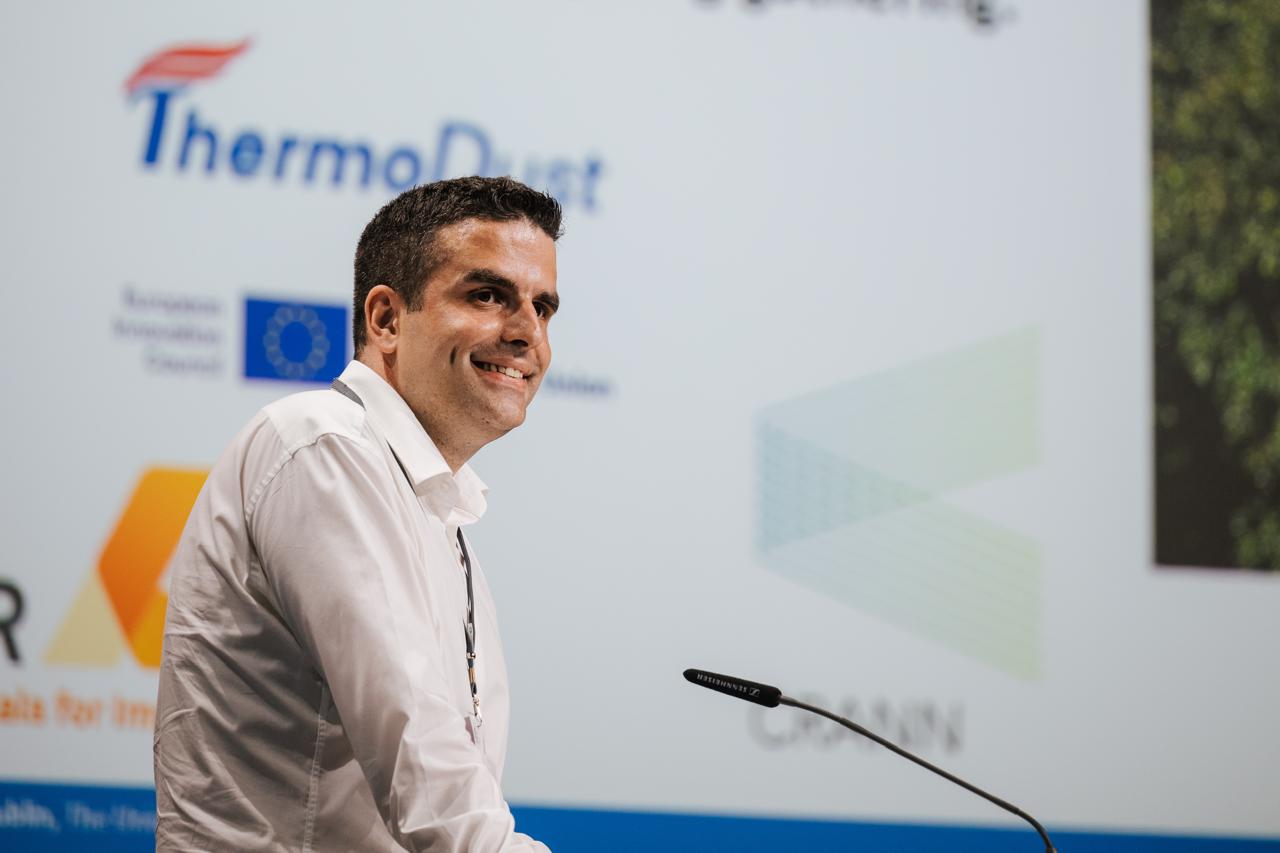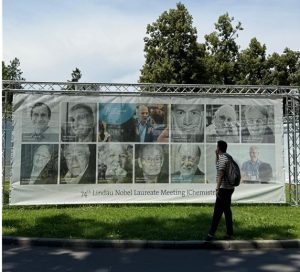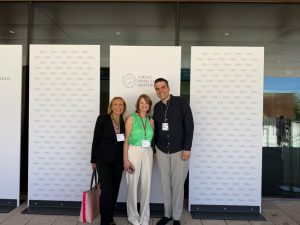My name is Apostolos Koutsioukis, and I am a materials chemist. I’m currently a postdoctoral researcher in the Department of Chemistry and CRANN at Trinity College Dublin, working in the group of Professor Valeria Nicolosi, Chair of Nanomaterials and Advanced Microscopy.
Modern life depends on energy—but the materials we rely on often fall short. Most cannot deliver both high performance and sustainability. My research focuses on two-dimensional (2D) materials, known for their outstanding mechanical, electronic, and thermal properties, and explores how they can be combined with metals to create advanced hybrid materials.
What drives me is the opportunity to bring together the best of both worlds: the tailored functionality of 2D materials with the recyclability, conductivity, and robustness of metals—starting from the particle level. We design composite materials that turn nanoscale synergies into real-world solutions for energy and sustainability challenges.
This project allows me to work at the crossroads of chemistry and engineering, tackling large-scale problems with real-world impact—especially in the evolving field of clean energy.
Tell us about your academic research and why you wanted to apply to participate in Lindau Nobel Meeting?
My research is all about designing better materials—mainly combining ultra-thin 2D materials with metals to create new composites that are not only high-performing, but also sustainable and recyclable. These materials can play a significant role in energy storage and other real-world applications. What really excites me is the challenge of starting at the nanoscale and ending up with something that could make a difference in the world. I applied to the Lindau Meeting because it felt like a once-in-a-lifetime chance to meet and learn from some of the greatest minds in chemistry—scientists whose work I’ve studied and admired for years. I wanted to hear how they have tackled major scientific questions, stayed motivated, and envisioned the future of science. But beyond the Nobel Laureates, I was also really drawn to the idea of meeting other young researchers from all over the world. As someone who’s moved between countries for my research, I know how powerful these international exchanges can be. I wanted to be part of that energy—to share, to learn, and hopefully to build new collaborations.
What did it mean for you to be selected for Lindau?
Being selected for the Lindau Nobel Laureate Meeting was a big honour for me—and something very personal. Since I was a child, I’ve loved science. Chemistry, especially, caught my interest because it helps explain how the world works in such a clear and logical way.
Getting the chance to meet Nobel Laureates—the scientists behind discoveries I’ve read about and admired—was honestly a dream come true. Hearing them talk about staying curious, dealing with uncertainty, and making an impact over many years was truly inspiring. As a Greek researcher working in Ireland, this experience meant even more. It reminded me that science connects people across countries and cultures. I was proud to represent Ireland at such an international event.
Lindau also gave me a broader perspective on science. I wanted to hear how these amazing scientists think and work, and to learn how to bring that mindset into my own research. Since I work at the border of chemistry and engineering, it was also a chance to meet researchers from different areas and start new conversations about the future of materials.
Can you tell us about the particularly notable meetings you attended?
During the week at Lindau, I was amazed by how much inspiration and knowledge was all around.
One unforgettable moment was the dinner sponsored by the German Research Foundation, where I had the chance to sit next to Prof. Dan Shechtman — the first materials scientist I ever studied during my undergraduate years. That evening was especially meaningful.
I also went to a dinner hosted by MARS, where I learned a lot about how creative and valuable collaborations between academia and industry can be. Another highlight was sharing lunch with Prof. Avram Hershko. He generously spoke about his personal journey in science, which gave me a deeper perspective on how scientists grow and evolve over time.
But perhaps the most powerful moment for me was getting the chance to present my own research to this amazing group of scientists. It was both humbling and empowering — a moment I will never forget.
Did you participate in any one-to-one meetings and, if so, can you tell us how these went?
Yes, I had the chance to take part in several one-to-one meetings during the Lindau Meeting, and they were incredibly valuable. These smaller conversations gave me the opportunity to explain my research in depth, get personal feedback, and even talk about possible collaborations — something that’s hard to do in bigger sessions.
Meeting Nobel Laureates face-to-face was both inspiring and humbling. I was amazed by how open and generous they were with their time and advice. It showed how much they care about supporting young scientists. We didn’t just talk about research — we also spoke about how to build a career in science, deal with challenges, and stay curious along the way. One thing I took away from these conversations is that scientific progress is truly a human achievement that directly impacts people’s lives. This progress starts with how we work within teams, how we lead, and how we support each other. Beyond being excellent scientists, it’s equally important to be good people. That balance is essential for meaningful and lasting contributions to science and society. These meetings were a highlight of the week. They gave me a lot of motivation, fresh ideas, and a sense of confidence to keep pushing forward with my work.
What Nobel Laureates did you meet during your time at Lindau and what was the experience like?
During my time at Lindau, I had the incredible privilege of meeting several Nobel Laureates whose work has profoundly shaped my field. This included Prof. Akira Yoshino and Professor M. Stanley Whittingham, pioneers in battery chemistry whose research is foundational to modern energy storage. I was also honoured to meet Prof. Dan Shechtman, whose groundbreaking discovery of quasicrystals first inspired my fascination with materials science during my undergraduate years. Additionally, I had the privilege to meet Prof. Jean Marie Lehn, who reminded us of the importance of hard work and strong work ethic in research—an inspiring and truly memorable moment. I also had the unique opportunity to engage in a personal conversation with Prof. Moungi Bawendi, who generously shared valuable insights about his scientific journey and life, emphasizing the importance of being both resilient and patient. Meeting these extraordinary scientists was both humbling and inspiring. Their passion, dedication, and openness reinforced my own commitment to research and innovation.
What was your experience of meeting with fellow early-career researchers?
Meeting fellow early-career researchers at Lindau was an inspiring and unforgettable experience. I connected with passionate scientists from around the world, all driven by a shared commitment to impactful research. The diversity of backgrounds and perspectives sparked rich, meaningful dialogue throughout the week. The emotions on the final day were powerful — knowing these intense days were ending and that I would deeply miss these new connections. Yet, returning home to messages from new friends and the potential for future collaborations made it clear that Lindau was much more than a meeting; it marked the start of lasting scientific relationships and networks.
Can you sum up your experience at Lindau and why do you think it is important?
My experience at the Lindau Nobel Laureate Meeting was truly life-changing. It gave me a unique chance to meet some of the greatest minds in science, learn from their personal stories, and think about how research impacts the world beyond the lab. Lindau is special because it brings together Nobel Laureates and early-career researchers in one place to share knowledge, inspire each other, and build a global scientific community. This exchange of ideas drives innovation and encourages collaborations across different fields and countries. On a personal level, as globalization makes our world more connected but also more complex, I wanted to broaden my perspective by listening to and sharing experiences with people from diverse backgrounds—not just Europe and the US, but also places like Chile and Argentina. This helped me grow my empathy and better understand the global challenges we all face.


